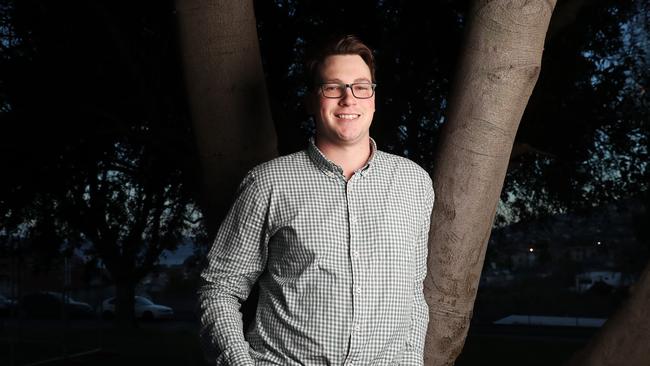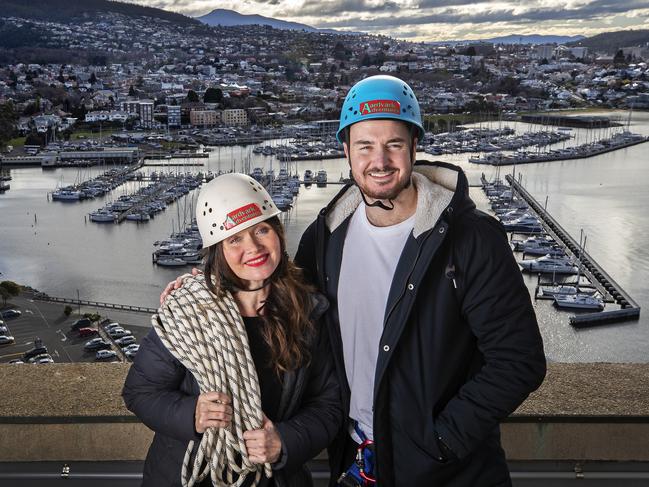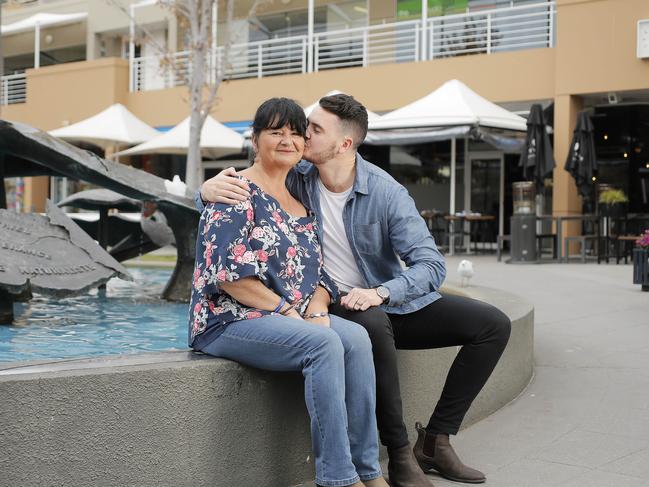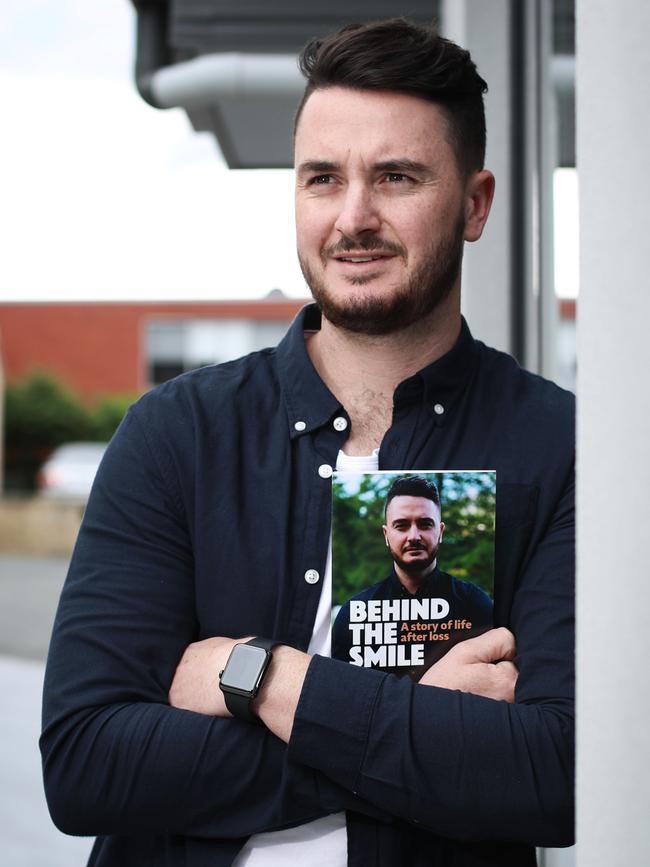Suffering from ongoing left side muscle weakness and fatigue after two strokes, Jake Vincent understands all too well the importance of not only treating strokes but preventing them from reoccurring.
Australian researchers will soon lead a world first trial involving a new anti-clotting drug that when used in tandem with the typical stroke medication can dissolve the blood clot more effectively, prevent it from returning and prevent bleeding on the brain.
After the 24 year old Hobart resident suffered a stroke in March 2019, where he experienced facial drooping, an inability to stand, left side muscle weakness and eight hours of total paralysis of movement, he was mostly recovered within a couple of days and thought the awful ordeal was over.
But only nine days later he suffered another milder stroke and spent seven days in a specialised neurology clinic in Melbourne.
Mr Vincent hopes the new trial will mean that more people can be prevented from experiencing the often debilitating and lifelong effects of a stroke.
Lead researcher Professor Shaun Jackson from the Heart Research Institute says administering treatment within the first several hours after a stroke is crucial and the clot dissolving drug tPA is currently the only drug available.

“Unfortunately tPA has many limitations and doesn’t work effectively in many stroke patients and there is a need to identify new anti-clotting approaches that can improve the function of tPA and reduce stroke injury,” he said.
“In our preclinical models, we have shown that our anti-clotting drug, when combined with tPA, not only dissolves a blood clot from a stroke more effectively than tPA alone but it can stop the clot from reforming.
“It does this without an added risk of bleeding.”
In the case of Mr Vincent’s second stroke, there was too much of a delay for the standard tPA drug to be effective, which highlights the importance of this new trial in opening up opportunities for stroke treatment.
“The limitations of tPA mean that the majority of people who present with a stroke may not be offered any therapy, we can basically only offer them supportive care,” Mr Jackson said.
The academic-led clinical trial funded by the federal government will commence in early 2022 within leading stroke units across the country and managed by the George Institute.
The Stroke Foundation said that around 1500 Tasmanians will experience strokes each year, which is some of the highest incidences of stroke per capita in Australia.
Mental health classes should be as normal as maths, English
EVERY day in Australia at least one young person under the age of 25 dies by suicide.
And Tasmania has one of the highest suicide rates (per capita) in the nation, second only to the Northern Territory.
It’s a worrying statistic, but one that Tasmania’s Mitch McPherson, founder of suicide prevention charity SPEAK UP! Stay ChatTY hopes to help turn around.
The 33-year-old is concerned that, despite the rising death rate among young Australians – figures have grown steadily over the past decade and over a third of all deaths in people aged 15-24 are by suicide – many people don’t want to talk about the issue.
READ MORE: ‘Every life is one too many’: Fight to save young Tasmanians
McPherson, who started SPEAK UP! Stay ChatTY eight years ago after his 18-year-old brother Ty took his own life, says many consider suicide a taboo topic, and think if they talk about suicide it will become more prevalent. But he says there’s no evidence to suggest that is the case.

In fact, talking to kids, and making them more aware of some of the mental health challenges they might face and what to do if they need help, can ease the burden.
Fortunately, McPherson says, the tide is beginning to turn, with a rising number of schools, workplaces, church groups and sporting clubs approaching SPEAK UP! Stay ChatTY to provide educational sessions for young Tasmanians.
Parents, teachers and sporting coaches are among those making contact, with an increasing number of requests for programs to help younger children in upper primary or lower secondary school.
Traditionally, SPEAK UP! Stay ChatTY, in conjunction with Relationships Australia, has run education sessions in Tasmania’s public, Catholic and independent schools aimed at students in Grades 9-12 (aged 15-18). The organisation also offers sessions for teachers and parents to better understand mental health and help young people.
“There’s a misconception that mental health is a negative thing,” McPherson says.
“But what is important for people to realise is that we slide up and down a continuum. We all have good days and bad days.
“If you wake up and you have a bad day it doesn’t mean you’re depressed, it’s okay to feel like that sometimes.”
He says it’s when people start having more bad days than good that they need to seek help.
Mental illness is the most common health issue among young people with about 75 per cent of issues presenting before the age of 25.

Mental health presentations by young Tasmanians at the Royal Hobart Hospital’s emergency department have doubled in recent years. There were 200 presentations for anxiety, depression, suicidal thoughts and other mental health issues among Tasmanians under 18 in 2016, compared with more than 400 in 2019. The majority of those were aged between 14-17.
Meanwhile figures from the Australian Institute of Health and Welfare show suicide is the leading cause of death among Australians aged 15-24. In 2019, 384 young people aged 18-24 took their own lives while 96 deaths occurred among children and adolescents under 18, with the majority of those aged 15-17. That’s an average of 1.3 deaths every day in Australians under 25.
The SPEAK UP! Stay ChatTY sessions are built around McPherson sharing his own experience of losing his brother and present a range of practical real-life scenarios to students, such as how to identify concerning posts on social media, how to help friends who are having a tough time, and encouraging students to identify people in their life who they can trust and talk to.
There is clinical support in the room from a child psychologist, who can speak to students one-on-one if necessary.

McPherson says the programs are working well, with a lot of positive feedback showing the sessions are making a difference and have helped kickstart important conversations at home and at school. But there’s also a need to start the process earlier.
“By the time they get to Year 9 and attend one of our sessions we’re talking about things that some of the students might have been dealing with for a number of years,” McPherson says. “We’re starting to get a lot more requests from younger people who are wanting to know more about mental health.”
Later this year McPherson hopes to start rolling out a new program for Grades 6-8 (aged 12-15). He’s also working on a separate program that will cater for children who are even younger.
“Our goal for the next five to 10 years is that we want to be ready,” McPherson explains.
“We want absolutely anyone to be able to ring us and say we want to help educate children of a particular age, and we want to be able to help and have an evidence-informed and age-specific presentation ready to go.”
He says the programs don’t aim to be confronting, but rather break down the stigma around mental health and wellbeing and raise awareness about services that are available to help young people.
“We aim to show kids that life is tough and you might go through challenges,” McPherson says. “It’s really important at as young an age as possible that kids can identify the people who can support them if they ever need it.”
He says if these kinds of programs existed at school when he was younger then perhaps his brother would have felt more comfortable to talk to his family or friends about how he was feeling.

“At school I was always heading off to maths and English … but if there had been a wellbeing class I probably would have got more out of that than anything else,” McPherson says. “And maybe I would have been able to have a lifesaving conversation with Ty.
“There’s a quote I heard somewhere ‘check on your happy friends’. And that’s so important. Mental health doesn’t discriminate. Ty was popular. He was the life of the party. But behind the facade he was battling.
“And looking back now, the signs were there. He was a bit flat those last couple of weeks, he wasn’t himself.”
McPherson was 25 when 18-year-old Ty died. He created a car bumper sticker to honour his younger brother and raise money for suicide awareness and prevention. Then he was approached to speak at public events, and that eventually grew into the not-for-profit organisation which has its eighth birthday this month and now has 10 “passionate and energetic” staff that McPherson says are “a joy to work with”.
A number of high-profile Tasmanians, including sports stars, celebrities and politicians have thrown their support behind the well-respected organisation – a recent Shorts Day fundraiser, which encouraged Tasmanians to wear shorts in the depths of winter to help spark conversations about mental health, raised about $50,000.
“There was so much darkness and anger around Ty taking his life,” McPherson says.
“I didn’t want there to always be a sense of anger around what happened so I looked for a way to turn a negative into positive. I was a 25-year-old glazier with minimal drive and no real ambition to do anything extraordinary with my life. Now I absolutely live a purposeful life. I love what I do, I love my job. But at the same time I also wish I didn’t have to do it.”

McPherson, who was named Tasmania’s Young Australian of the Year in 2017 and published a book called Behind the Smile – A Story of Life After Loss in 2018, has shared his story more than 850 times.
He admits he doesn’t always feel like sharing that story, and it does take an emotional toll at times.
“I wouldn’t say I look forward to it,” he says. “But I do still enjoy it … the moment I don’t enjoy it I will stop doing it.”
If he’s having a bad day or is feeling drained after a particularly emotional presentation he keeps coming back to his “why”, which he says is especially relevant since becoming a dad to daughter Maya who is 16 months old.
“I think about my why and that’s my parents and my daughter,” he says.
“And if Maya has challenges in life I want her to be able to talk about those struggles and troubles. When she’s 15 or 16 I want her to be more confident talking about mental health than we ever were.”

So he’s keen to keep the conversation going.
“Some people have said to me over the years, ‘you can’t talk about suicide, how dare you do that’,” McPherson says. “There are still people out there that think that talking about suicide puts the idea in people’s heads. But there’s no evidence to support that. I know that not everyone wants to talk about it and I totally respect that. But if it is spoken about it needs to be done safely and respectfully. Two things that we at Stay ChatTY pride ourselves on when talking about the topic across the state.
“Suicide can happen to anyone – that’s my story and what I talk about. People should never walk around thinking ‘this won’t happen to me’. And if people are having a bad day they need to know that it’s okay to talk about it.
“It’s OK to not be OK.”
If this story has raised any issues for you call Lifeline on 13 11 14, Beyond Blue on 1300 224 636 or Kids Helpline on 1800 551 800. For more information about SPEAK UP! Stay ChatTY you can visit staychatty.com.au

Add your comment to this story
To join the conversation, please log in. Don't have an account? Register
Join the conversation, you are commenting as Logout
Tas dream analyst on 13 common dreams and what they mean
She studied zoology and neurobiology before delving into the world of dreams. Now Tasmania’s own dream analyst offers insight into why we dream and what our dreams actually mean.
Tassie singer defies odds to achieve music dreams
She’s performed alongside award-winning musos Thelma Plum and Lucky Oceans and was mentored by Kate Miller-Heidke. Now Tassie’s Kaytlyn Johnson launches an exciting new music project